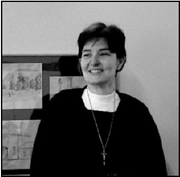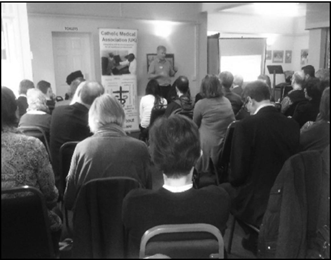Catholic Medical Quarterly Volume 69(3) August 2019
Report
CMA Annual Conference 2019:
“Following Jesus In Healthcare”
Sister Andrea Fraile of the Sisters of the Gospel of Life
 This,
the Association’s flagship event, was held in Hull University Chaplaincy
on Saturday 4th May. The focus was billed as aiming to help Catholic
healthcare workers answer four important questions:
This,
the Association’s flagship event, was held in Hull University Chaplaincy
on Saturday 4th May. The focus was billed as aiming to help Catholic
healthcare workers answer four important questions:
- How can we keep a strong faith in a busy career?
- How do we bring hope?
- What is the purpose of healing and healthcare?
- How can we “live our faith” at work?
The venue was ideal – comfortable and well equipped, with rooms ideal for the formal presentations as well as for the social parts of the conference. The audience of attendees – a group of 50 of diverse ages and backgrounds, including students, nurses, midwives, doctors from various specialties, members of the clergy and interested non-medical lay persons– was made very welcome by the Hull University chaplain, Fr Mansell, and was all well fed and watered thanks to the sterling efforts of Dr Mrs Josephine Treolar and her band of volunteers (especially other Treolar family members!). Local accommodation was organised, varying from simple but comfortable rooms in the chaplaincy to local hotels, allowing those on various budgets to attend.
Sessions started and ended with a prayer, and we were fortunate to have a daytime Saturday mass in the delightfully small and friendly chaplaincy chapel and later the opportunity to attend together the vigil mass of Sunday in the parish church next door.
David Quinn, Director of the Iona Institute and former editor of the “Irish Catholic”, gave an excellent keynote address “Bringing faith into public life” expounding on how the Catholic voice had been lost in the public space in Ireland, and how efforts to make it heard once again are giving hope.
 Sr
Andrea Fraile, from Glasgow, gave an inspirational talk in her lovely
accent on “Helping people in a crisis: the work of the Sisters of the
Gospel of Life”. The loving but no-nonsense approach of the sisters, both
to helping those facing fear around pregnancy and considering abortion,
and to healing those damaged by having had an abortion, was very affirming
of Christ’s message. Giving hope and offering Christian healing are at the
heart of their mission.
Sr
Andrea Fraile, from Glasgow, gave an inspirational talk in her lovely
accent on “Helping people in a crisis: the work of the Sisters of the
Gospel of Life”. The loving but no-nonsense approach of the sisters, both
to helping those facing fear around pregnancy and considering abortion,
and to healing those damaged by having had an abortion, was very affirming
of Christ’s message. Giving hope and offering Christian healing are at the
heart of their mission.
The other speakers, too, gave moving personal testimony of how their faith has inspired the best elements of their work, and how reflections around “healing” as opposed to “curing” have helped identify best practice. Practical advice and sharing of experiences on how to overcome forces opposed to the Christian view of care and social justice through bravely living one’s faith were very moving. These sessions were wide-ranging and included:
- “Being made whole”: the purpose of healing and the purpose of healthcare” by Dr Adrian Treloar, which offered an understanding of how a prayerful and thoughtful professional life allows us to identify those most in need and what those needs might be, focussing on the needs of those with dementia and how their “personhood” demands that they are as worthy as anyone else of the best of care.
- “Caring for the sick in Lourdes” by Dr Joseph O’Dwyer, a stimulating review of the difficulties and need for attention to detail when organising and carrying out medical support for a large diocesan pilgrimage, taking many sick and disabled pilgrims and carers - away from their comfort zones, but showing how the benefits far outweigh the costs.
- “Living our faith at work” by Dr Dermot Kearney, our young and dynamic president, was a moving account of how a strong faith allows us to support each other in times of trial and pressure to go against our Christian principles, and, combined with powerful reflections on their own professional lives by two other inspiring doctors, Mike Delaney (“Keeping a strong faith in a busy career”) and Rob Hardie (“Bringing hope to the sick: A Christian General Practice Surgery”) made a strong impression on those attending.
- “Faith at work”, by Julia Herbertson, was a story of how, even in the field of obstetrics and gynaecology, where the forces of secularism and evil disregard for the sanctity of life hold particular sway, a midwife with a strong Catholic faith and a determination to hold to her convictions is able to do so with the help of prayer and of support from like-minded colleagues, often from other Christian denominations. This reporter was especially moved by this testimony – like many juniors in the medical world, he had found the joy of being involved in and helping ensure the best outcomes for mother and child at the time of birth to be an uplifting aspect of medical practice, only to find he lacked the courage in his formative years (in the 1980s) to pursue this as an area of practice because of a lack of courage to face up to those with a different view of the sanctity of life. It is a joy to hear that Christian witness is possible in this area and humbling to hear about Julia’s bravery in this.
All sessions generated discussion and contributions from the floor, and overall, attendees felt this was a stimulating, enjoyable and life- and faith-affirming day, well spent. The author, for one, feels much better prepared to “follow Jesus” in his work, and the conference as a whole really did provide answers and areas for further reflection in response to the four questions highlighted at the head of this report.
